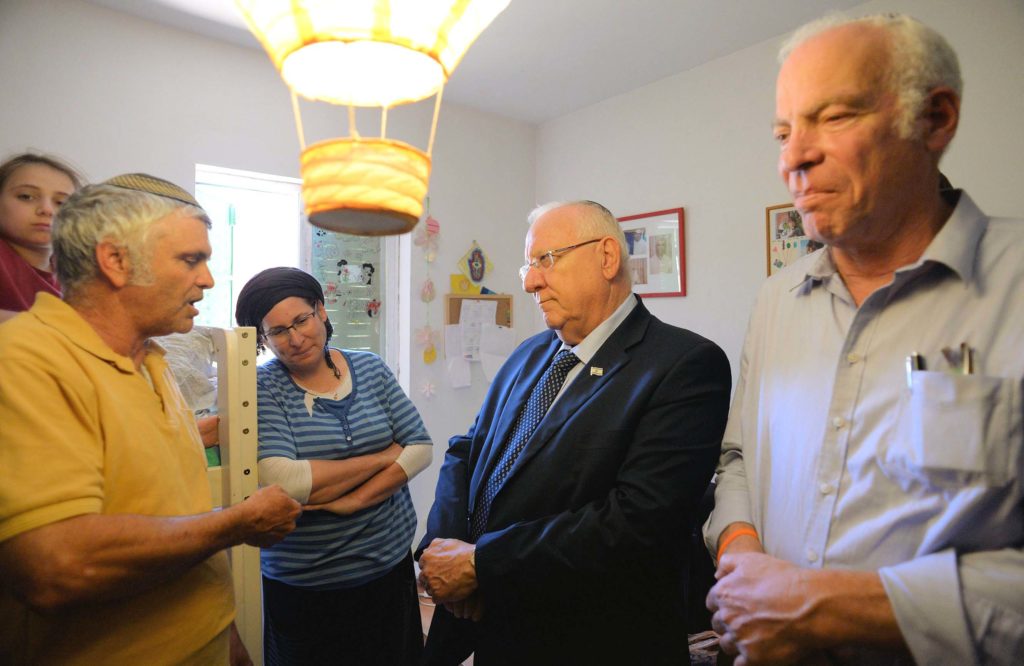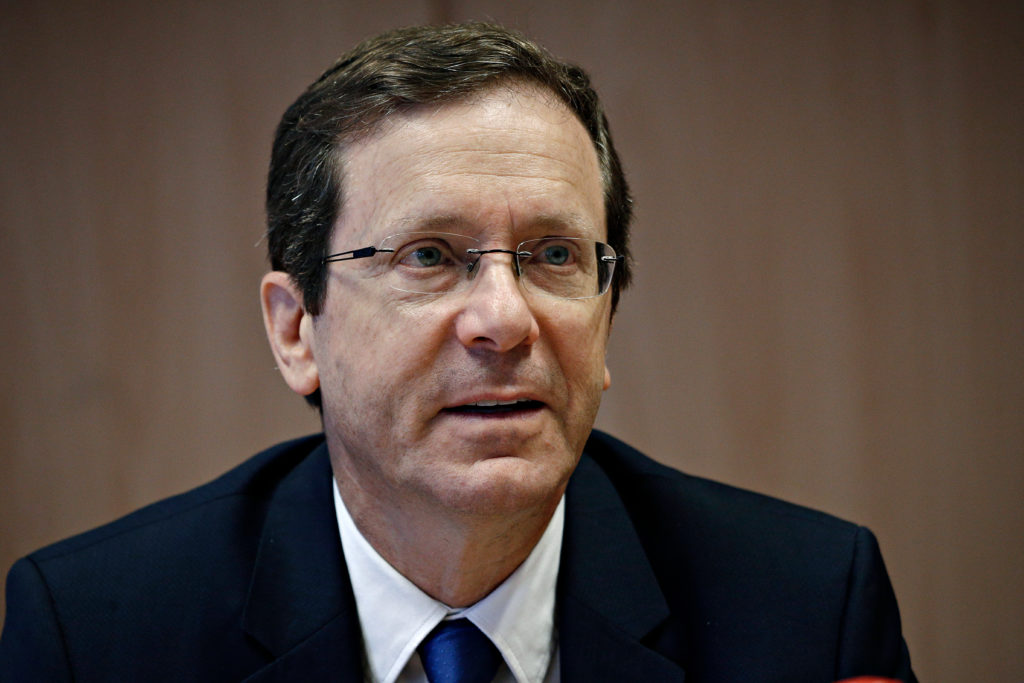Australia/Israel Review
Presidents without Precedent
Jul 26, 2021 | Amotz Asa-El

From Rivlin to Herzog in Israel
Facing Israel’s entire legislature and cabinet, as well as millions of television viewers, a characteristically humble President Reuven Rivlin turned to his grandchildren at the end of his farewell address, saying, “I am returning.”
As he handed over the presidency of Israel to Isaac Herzog, there was no mistaking the sense of relief with which the 82-year-old former speaker of the Knesset ended not only his seven-year term as Israel’s First Citizen, but a 43-year political career.
Rivlin presided over what was by far the most turbulent presidential term in Israel’s history.
Constitutionally, as Israel went to elections five times during his presidency, Rivlin was repeatedly tasked with appointing someone to seek a parliamentary majority to become prime minister. Twice he also had to select a second nominee, because the first had failed to form a government.
Eager to help stabilise the system, in April 2020 Rivlin was instrumental in creating the broad unity government that successfully fought the COVID pandemic.
Socially, Rivlin’s task was to make Israel’s disparate, and often conflicted, sectors feel he was everyone’s president, and even more improbably, that they were all members of one society.
Both emotionally and intellectually, he rose to the challenge.
An affable, humorous, and outgoing conversationalist, Rivlin visited more than 900 cities, villages, businesses, schools, and other varied social institutions across the country. He also visited the homes of 190 fallen soldiers and 62 victims of terrorist attacks.
A liberal nationalist who followed in the footsteps of Menachem Begin, Rivlin fought for equality for Israel’s Arab citizens, and thus became a champion of the Left despite never compromising his faith in territorial maximalism.
In a widely quoted speech delivered early in his term, he told the annual Herzliya Conference on national security that Israeli society comprises four tribes: the secular, religious, ultra-Orthodox and Arab populations. The task of Israeli leaders, he said, is to make these groups harmonise rather than confront each other.
The speech came to be known as “The Tribes Speech”, and it became particularly relevant in the last weeks of Rivlin’s term, as Israel faced the worst ethnic violence in its history during the Hamas-Israel war in May. It was a bitter finale for a term of office in which the President stubbornly embodied what united Israelis, while others tried to divide them.
As if the social tension and political acrimony he faced were not enough, in 2020 Rivlin also grappled with personal loss, as his wife of nearly half a century, Nechama, died of lung disease at 73.
In his farewell address, with his voice trembling, Rivlin said that he misses her every day, thus eliciting the genuine sympathy of a strained society which found in its tenth President a national unifier – something that the politicians he dealt with consistently failed to produce.
The 11th President’s task will be no less daunting, and maybe more so.
Having just turned 60, Herzog is in his political prime, and eager to make the most of it.
Like Rivlin, whose father was a Hebrew University professor of Muslim civilisation, Herzog has an enviable pedigree. The son of Chaim Herzog, Israel’s sixth president, he is a product of Israel’s elite establishment.
When the new President was born, his father was a general, head of Military Intelligence. When he was in his teens, his father was ambassador to the United Nations. In the interstices between these roles, Chaim Herzog was a partner in one of Tel Aviv’s leading law firms, which the younger Herzog would later join.
Going back further, the grandfather after whom Isaac Herzog is named was Israel’s first chief rabbi. Furthermore, Herzog’s uncle was Abba Eban, Golda Meir’s fabled foreign minister. Eban’s wife, Suzie, was the sister of Herzog’s mother, Aura.
Such an elite background might have hurt another person’s presidential bid. The ultra-Orthodox Shas party, for instance, which seeks traditional working-class votes, might raise objections to such an aristocratic pedigree. Even more problematic might have been Herzog’s leading role in the Labor Party, which he headed while running for the premiership against Binyamin Netanyahu last decade. That history might have made him unacceptable to Likud.
Yet no such opposition manifested itself.
Israeli presidents are elected by the Knesset’s 120 members in a secret ballot. Herzog faced Miriam Peretz, an educator and social activist who lost two of her six children while they were fighting in the IDF, one in Gaza, the other in Lebanon. She is widely admired in Israel as a paragon of resilience, compassion and patriotism, yet Herzog defeated Peretz by a vote of 87 to 26, the largest margin ever in an Israeli presidential vote.
While part of this gap was due to Peretz’s lack of political experience, Herzog’s decisive victory also reflected his reputation as serious and sensible, as well as his record as a tactful politician who, during two decades in public office, made few significant enemies.

New Israeli President Isaac Herzog: Known as serious, sensible and a tactful politician (Credit: Alexandros Michailidis/ Shutterstock)
Herzog entered the political fray in 1999 as Ehud Barak’s cabinet secretary, an unelected position, after which he was elected to the Knesset where he served as a lawmaker for 15 years. During those years, he served in the Sharon, Olmert, and Netanyahu governments, as Minister of Housing, Welfare, Tourism and Diaspora Affairs.
Herzog’s record in these seemingly boring ministries showed him to be a compassionate man who worked diligently for disadvantaged groups, like Holocaust survivors, abused women and children at risk. These ministerial achievements paved the way for his election as Labor party head, Leader of the Opposition, and later Chairman of the Jewish Agency.
By a curious coincidence, Herzog became President just after Netanyahu’s 12-year premiership ended on June 13. Netanyahu was succeeded in that role by Naftali Bennett of the right-wing Yamina (“rightward”) party, heading up an unprecedentedly diverse “government of change”.
Whether the new Government will last, and thus herald a new era, remains to be seen, but if it does, Herzog should fit smoothly within the new zeitgeist it is trying to inspire.
Led jointly by Bennett and centrist Foreign Minister Yair Lapid, in contrast to Netanyahu’s government by charisma, the pair’s experiment in collective leadership and governing via consensus embodies what Herzog’s career has been largely about.
As Leader of the Opposition, Herzog harnessed Arab and ultra-Orthodox parties to promote social causes jointly with Labor, thus displaying an inclination and ability to build coalitions.
A similar pattern surfaced when Herzog won the Jewish Agency’s chairmanship, enjoying the support of its board of governors despite representing the opposition. This was the first time since 1948 that this time-honoured organisation installed a chairperson who was not identified with Israel’s ruling party.
Herzog can thus be expected to work well with the new Government, whose key figures are all his personal friends. Then again, his presidency’s big test may involve not the coalition, but the opposition. Once Netanyahu’s ongoing corruption trial concludes, a constitutional crisis, accompanied by social division, may follow.
If Netanyahu is convicted, Herzog will have to combine his political inventiveness and his lawyerly skills – possibly devising some kind of mechanism involving a pardon in return for a departure from public office.
In less dramatic times, Herzog will likely be very active in the international arena, a role for which he has prepared since his high-school days as an ambassador’s son in New York. He has begun playing this role already, holding a long phone conversation with Turkish President Recep Tayyip Erdogan on July 12.
These, then, are the tasks awaiting Herzog – who, unlike his predecessor, may potentially want to use his presidential term as a springboard for another shot at the premiership.
Whether that will be realistic will depend on the events of the coming seven years. Until then, the 11th President and his wife Michal, a lawyer he met when they served in the same IDF intelligence unit, will try to make the most of life in the handsome presidential house in the upmarket Talbiya neighbourhood of Jerusalem.
Getting together on weekends with their three sons, aged 22 to 31, they will likely recall with nostalgia past Shabbat meals in the same house back in their twenties – when Isaac’s father Chaim lived there as president.
Tags: Isaac Herzog, Israel, Reuven Rivlin






